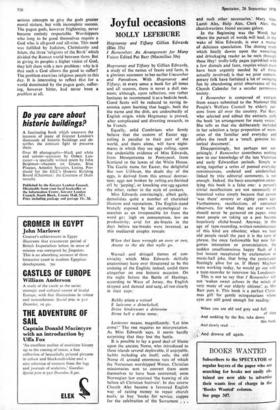Joyful occasions
MOLLY LEFEBURE
Hogmanay and Tiffany Gillian Edwards (Bles 35s) I Remember: An Arrangement for Many Voices Edited Pat Barr (Macmillan 30s) Hogmanay and Tiffany by Gillian Edwards, a study of the names of feasts and fasts, is a glorious successor to her earlier Uncumber and Pantaloon. With Hogmanay and Tiffany, in every sense a book for all times and all seasons, there is never a dull mo- ment; although, upon reflection, one rather hesitates to recommend it as a bedside book. Good Scots will be reduced to raving in- somnia upon learning that haggis, both the the name and the dish, are undoubtedly of English origin, while Hogmanay is proved, after complicated and diverting research, to be French.
Equally, solid Cumbrians who firmly believe that the custom of Easter egg- rolling is peculiar to their part of the world, and theirs alone, will have night- mares in which they see eggs rolling, upon the undeniable evidence of Miss Edwards, from Mesopotamia to Pontypool, from Scotland to the lawns of the White House. The Gaelic name for Easter, the delightful Bas nan Uibhean, the death day of the eggs, is derived from this annual destruc- tion; eggs not broken by rolling are finished off by `jarping', or knocking one egg against the other, rather in the style of conkers.
Miss Edwards convincingly, albeit gaily, demolishes quite a number of cherished illusions and reputations. The English stand brutally exposed by her etymological re- searches as an irresponsible lot from the word go: high on consumption, low on productivity; avid for ale-breaks in the days before tea-breaks were invented, as this mediaeval couplet reveals: When thei have wrought an oure or two, Anone to the ale thei wylle go.
Wassail and dringail (terms of con- viviality which Miss Edwards skilfully anatomises) have ever threatened to be the undoing of the English; indeed, undid them altogether on one historic occasion. On the night before the Battle of Hastings, according to Wace of Jersey, the English skipped and danced and sang, all too clearly in their cups: Bublie crient e weissel E laticome e drinckeheil, Drinc hindrewart e drintome Drinc hell e drinc tome.
Laticome means, magnificently, 'Let him come!' The rest requires no interpretation. As Miss Edwards says, it seems hardly surprising that they lost the battle.
It is possible to lay a good deal of blame upon the ancient Norse, who introduced to these islands several deplorable, if enjoyable, habits including ale itself; ealu, -the old Norse a around enormous vats of which the Norsemen worshipped Wotan. Christian missionaries sent to convert them seem themselves to have been converted; soon Norwegian law enjoined 'the brewing of ale before all Christian festivals'. In due course Church Ales became a favoured English way of raising money to repair church roofs, to buy 'books for service, cuppes for the celebration of the Sacrament . „ and such other necessaries.' Mary Ales, Lamb Ales, Help Ales, Clerk Ales; the churchwardens found excuses galore.
In the Beginning was the Word, but where the pursuit of words will lead, in the wake of Miss Edwards, is ever a matter of delicious speculation. The shining truth which finally dawns upon the wesseiling and drinckaging reader as he reels through these Hey! trolly-lolly pages (sprinkled with a few dismals and fasts, respites which must have been urgently needed by all those actually involved) is that we poor contem- porary folk have forfeited a lot of swinging fun by abandoning strict observance of the Church Calendar for a secular permissive society.
I Remember is composed of extracts from essays submitted to the National Old People's Welfare Council by elderly per- sons from all over the country. Pat Barr. who selected and edited the extracts, calls the book 'an arrangement for many voices.' She tells us that she deliberately included in her selettion a large- proportion of mem- ories of the familiar and everyday and offers the result as a 'small, genuine his- torical document'.
Disappointingly, but perhaps not sur- prisingly, I Remember contributes nothing new to our knowledge of the late Victorian and early Edwardian periods. Simply to string together a series of penned everyday reminiscences, undated and unidentified. linked. by trite editorial comments, is not enough. Indeed, the basic assumption under- lying this book is a false one: a person's trivial recollections are not necessarily of historical value simply because that person 'was there' seventy or eighty years ago. Furthermore, recollections of untrained observers, for what they are ever worth. should never be garnered on paper, since most people on taking up a pen become hopelessly clichd-bound. Anyway, in this age of tape-recording, written reminiscences of this kind are obsolete; when we hear old people recall the past it is the turn of phrase, the once fashionable but now for- gotten intonation or pronunciation, the sudden unselfconscious happy flash of a lost instant recaptured by exclamation or music-hall joke, that bring the yesteryears fleetingly alive for us. If Henry Mayhew were working today, he would go out with a tape-recorder to interview his Londoners.
This is not to say that I Remember will not 'waken sweet echoes in the minds of very many of our elderly citizens', as Mrs Barr puts it. This book is a perfect Christ- mas gift' for gentle -octogenarians whose eyes are still good enough for reading:
When you are old and grey and full of sleep And nodding by the fire, take down this book.
And slowly read. ..
And drowse off again.


































 Previous page
Previous page